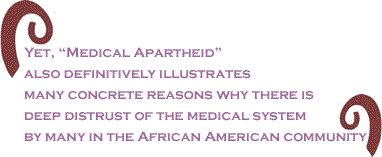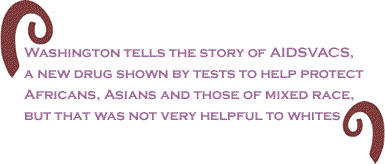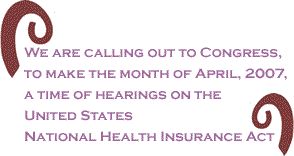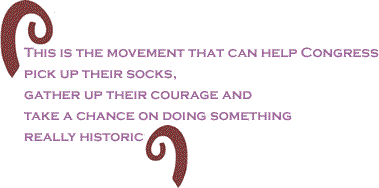
|
|||||||||||||||||||||
 |
|||||||||||||||||||||
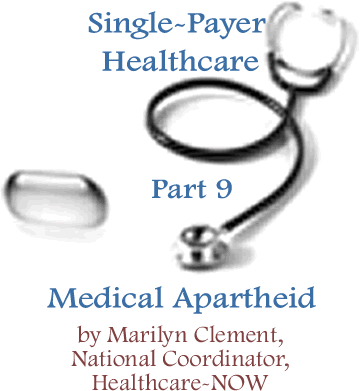 |
|
|
Among the myriad sober and celebratory events of all kinds during Black History Month, medical historian, Harriet Washington, will be recounting the disgraceful use of the bodies of people of African descent for medical experimentation. She is the author of a newly released authoritative book, “Medical Apartheid,” spelling out some of this history in horrific detail. I went to the thesaurus on my computer to find a 21st century definition of apartheid. The pickings were slim. The quest for a comprehensive definition took me to this stingy entry “A political system in South Africa from 1948 to the early 1990s that separated the different peoples living there, and gave particular privileges to those of European origin.” No mention of the daily horrors or the consequences of such a system for people of color in South Africa or elsewhere suffering under apartheid. Researcher Harriet Washington leaves the internet description of apartheid as a pallid and dusty shell, an anomaly, rather than the living, breathing screaming truth that she describes in her book. She has posited accuracy and depth into the term “apartheid” as it has been experienced over the centuries. She details painfully and relentlessly one example after another of apartheid and dehumanization suffered by people of African descent as they have undergone the medical world of experimentation for the last three centuries.
The power of Washington’s book made me realize again how desperately we need a national single payer healthcare system – a system that will equalize access to healthcare and provide real quality healthcare to all, a system that so frightens the powers that be in this country. Yet, “Medical Apartheid” also definitively illustrates many concrete reasons why there is deep distrust of the medical system by many in the African American community. Wrenching control of that system away from the corporate interests and turning it over to our own public control is an important goal – within our reach in a few years if we continue to maintain the movement that is building for such a measure. But having a publicly-controlled healthcare system with everyone receiving a card as a birthright entitling them to access to quality healthcare from birth to death, still, at least for some years into the future, will be something to both cherish and to watch with an eye to disclosure of any racial disparities. The deep distrust of tests and prescriptions for new drugs and surgeries and potentially “miraculous experimental trials” is well founded. The U.S. system itself, with its emphasis on glory and fame as a reward for experimentation and invention, and ultimately massive profits for the experimentors and inventors, has inspired well-deserved caution in the face of the meager rewards to African Americans. Washington starts her 14th chapter,“James Quinn was only fifty two when he died in 2002, but he had suffered as no man has ever suffered before.” And then she goes on to tell the story of the African American man who thought he was being offered a great opportunity. “His surgeon, Dr. Louis E. Samuels, spoke triumphantly of Quinn having lived with his AbioCor artificial heart longer than anyone had expected – nine months. His wife remembers that his life was extended …but by pain, disappointment and despair.” He was bound to his bed by a lifeline that sustained him through a series of pneumonia and strokes. Mr. Quinn was the second black man to receive the AbioCor artificial heart. Mr. Robert Tools was the first, and he died with some of the same symptoms after living five months. Although the experiment was acclaimed by the white-controlled media, a few black newspapers asked whether he was chosen to be the first recipient because he was black and believed to be expendable. Others asked whether the artificial heart, “if it received FDA approval and was put on the market, would be affordable to black men. Or would they be shut out of the technology that they had helped to perfect?” HIV Aids research that helps whites more than blacks gets the bulk of the funding in the United States, although the preponderance of people with HIV are African American. Washington tells the story of AIDSVACS, a new drug shown by tests to help protect Africans, Asians and those of mixed race, but that was not very helpful to whites. According to Washington, trials were halted when its success among minorities and its failure among whites was discovered.
No one has suffered more than the children. Washington tells of the black boys in New York and Alabama who were secretly treated, i.e. “experimented on” while institutionalized. She recounts the myth of the “crack babies,” a total lie that demonized the babies but also differentiated, untruthfully, between crack (used mostly by blacks) and cocaine (used mostly by whites). “Inner city billboards offered $200 to crack addicts willing to become sterilized.” Says Washington, “The reproductive freedom of African Americans has been assailed by discouraging the birth of ‘inferior black progeny’ and by curtailing the fertility of black mothers. Flawed eugenic judgments continue to shadow the lives of African Americans, from the putative ‘crack babies’ who are now stigmatized teenagers to teen girls who are judged rather than counseled and protected from male predators.” One of the stories that affected me most was the first account in this long book of horrors, the history of Dr.James Marion Sims who has been lauded as “a great benefactor to women.” There are monuments to him in New York and in his native North Carolina where he bought women slaves for experimentation. Washington tells of a painting commissioned and distributed by Parke Davis pharmaceutical drug corporation of Dr. Sims where the women are looking at him humbly with looks of modesty and curiosity. This painting expounds the myth of the glories of medical experimentation. However, the reality was quite different. “Each naked unanesthetized slave woman had to be forcibly restrained by the other physicians through her shrieks of agony as Sims determinedly sliced, then sutured her genitalia. The other doctors, who could, fled when they could bear the horrific scenes no longer.” What happened to the infamous Dr. Sims? He became President of the American Medical Association in 1875. As we plan for the Martin Luther King, Jr. National Healthcare Month and a challenge to the new Congress to hear our complaints about the failed (never adequate) U.S. healthcare system and our need for a real healthcare system that serves all of us, Dr. King’s ringing tones jar us again, “Of all the forms of inequality, injustice in healthcare is the most shocking and inhumane.” We are calling out to Congress, to make the month of April, 2007, a time of hearings on the United States National Health Insurance Act. We are urging Congressman Charles Rangel, head of the House Ways and Means Committee to find a way and a means to push forward this discussion. We are also asking others in the House of Representatives to take up the issue of healthcare for all and push forward to hold serious hearings about how to get to quality equal healthcare in honor of Dr. King’s passion for healthcare for all. We are particularly calling on Chairman Rangel and Healthcare Sub-Committee Chair, Pete Stark to hold hearings on the best plan of the long list of inadequate plans being offered in Congress, in State Houses, and among presidential candidates. John Conyers’ United States National Health Insurance Act, H.R. 676, stands alone. During this Black History Month, Healthcare-NOW recommends the reading of “Medical Apartheid” and also the viewing of a short seven minute DVD of Congressman John Conyers talking about how we can win in our struggle to achieve an excellent healthcare system that serves us all. In this endearing thumbnail sketch you can see Conyers’ grasp of the history of struggle and the joy of winning against all odds. He points out that there is nothing more important than this struggle to win justice and no joy greater than being a part of it. He talks about those of us who came out of the Civil Rights era knowing that we can win something and says that when someone is in deep despair about the future and has no hope of winning, it is usually because he/she has not had that kind of experience. He talks about a white Senator who says to him, “John, I know you are right. Single payer is the best way to deal with the healthcare crisis. But, we just can’t do it. It is just too big – too way out there.” And he says, “This is a person that did not come out of the civil rights struggle.”
For example, he talks of Rosa Parks and postures the way she sat on the bus with her mouth set and her arms tightly crossed. “ If you are going to kill me, you can just go ahead and kill me right now. But I AM NOT LEAVING MY SEAT ON THIS BUS.” And he talks of a young lawyer who got fed up with the system and decided to run for Congress, himself. And WON – by 128 votes in a district that held half a million people. We at Healthcare-NOW believe that it is time to start winning again. We only need some Congress Members who have some courage. Who can help them get and sustain that courage? We are the ones. We are the only ones! There is a movement afoot for a national single payer healthcare system. It is a movement full of hope and determination. This is the movement that can help Congress pick up their socks, gather up their courage and take a chance on doing something really historic. The current majority in Congress have lived in 13 years of exile in the desert without the opportunity to hold hearings and pass legislation that would affirm the meaning of nation, a country that has a commitment to shared responsibility for each other and a nation dedicated by law to life liberty and the pursuit of happiness for all of the people. This last thirteen years has been characterized by a meanness of spirit and an insistence on “personal responsibility” for everything. It has insisted that there is no need for common, shared responsibility by a nation that cares for its people. “If you get sick, too bad. It’s your own fault. You lost your job? You have a chronic illness? You don’t have money to pay? Too bad. Just suffer and die!”
Now is our chance to change that, and John Conyers’ bill, H.R. 676, The United States National Health Insurance Act, is the vehicle. NOW is a strategic time to make a phone call to our Members of Congress and be sure that they are signed on as an endorser of H.R. 676. FREE calls to Congress 1-866-338-1015. Healthcare-NOW will provide a copy of the Conyers DVD, available free to anyone who would like to have one. Direct your request to Healthcare-NOW at 339 Lafayette Street, NYC 10012. 1-800-453-1305. “Medical Apartheid” is published by Doubleday and is available in bookstores or, if you are in New York City, meet the author and get a signed copy at the Black History Month event on February 22nd at St. Mary’s Episcopal Church, 521 West 126th Street. Marilyn Clement is the National Coordinator of Healthcare-NOW. Click here to contact Ms. Clement and Healthcare-NOW. Click here to read any of the articles in this special BC series on Single-Payer Healthcare. |
|
| Home | |
| February 8, 2007 Issue 216 |
||||||||||||||
|
||||||||||||||
| Printer Friendly Version in resizeable plain text format | ||||||||||||||
 |
||||||||||||||
|
||||||||||||||
 |
||||||||||||||
 |
||||||||||||||
 |
||||||||||||||
| |
||||||||||||||
| |
||||||||||||||






















